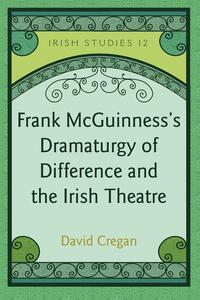
This book is the broad application of queer theories to the original plays of the contemporary Irish dramatist Frank McGuinness, the only author in Ireland to consistently utilize gay and lesbian themes in his writing. McGuinness continually represents sexual difference in his character development in a way that previous Irish authors have not. In particular McGuinness portrays homosexual protagonists in his dramas, allowing the queer the narrative prerogative, not merely a secondary role in the formation of theatrical perspective. Often it is the homosexual who tells the story or alters the plot through his or her alternative perspective. This book not only analyzes the queer in McGuinness’s work, but also contributes to a widening of the conversation and criticism on Irish theatre in general. Its implementation of the internationally recognized paradigm of analysis, queer theory, is cutting-edge in its contribution to the general field of Irish studies as well. As a result of its two-fold agenda of theatrical and cultural analysis, this book not only brings together theories of the queer and the theatre of McGuinness, but it also maps the way in which this queer dramaturgy intersects with contemporary Irish society as it faces a new era of cultural re-invention.